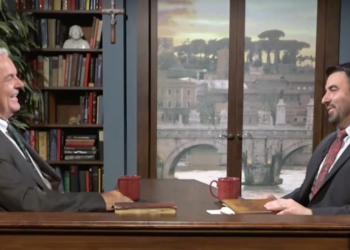I was recently sent a podcast conducted by two of my favorite thinkers: Bishop Robert Barron and Michael Knowles. It was a wide-ranging discussion of theology, philosophy, politics, culture, and film, prompted by Knowles writing the foreword to a reissue of William F. Buckley, Jr.’s classic God and Man at Yale. Himself a conservative Yale graduate, Knowles was a good choice for the foreword.
The film finishes with the Clooney character, a Roman centurion, on his knees in amazement not at the message of communism but of the crucifixion.
Knowles did an excellent foreword for my book The Devil and Karl Marx, and Marxism came up as a topic of discussion between him and Bishop Barron. The podcast journeyed from Marx to Marcuse to Hollywood, where the two interlocutors locked into something that particularly caught my attention.
Knowles and Barron fell into a fun discussion of the 2016 film, Hail, Caesar!, done by the talented and very interesting Coen brothers. They do excellent work, and their films often have amusing quirks, including a scene in Hail, Caesar! that Knowles and Barron laughed and marveled at, as did I when I finally watched this movie upon their recommendation. It’s worth unpacking a bit because I, your faithful columnist and Cold War historian, might be able to add some historical insights for your edification and pleasure.
Hail, Caesar! is set in Hollywood’s Golden Age, which coincided with the launch of Soviet communism and the all-out effort by the Comintern to spread global Marxism. Communists quickly set their sights on the thriving new medium of film. Vladimir Lenin said that “of all the arts, for us the most important is cinema.” Grigori Zinoviev, the important head of the Comintern, declared that motion pictures “can and must become a mighty weapon of communist propaganda and for the enlightening of the widest working masses.” Stalin in March 1928 held the first Party Conference on Cinema.
The Soviets realized, of course, that nowhere was the movie industry as advanced and influential as the United States of America. Their Party hacks in the United States saluted their red flag and got to work. Leading the charge were communist union heads and screenwriters. In 1946, Dalton Trumbo declared that “every screenwriter worth his salt wages the battle in his own way — a kind of literary guerrilla warfare.” Trumbo said that to fail to employ the medium of film would be “tantamount to abandoning the struggle altogether.”
A fellow screenwriter and ideological thug who angrily enforced that warfare was John Howard Lawson, known as “Hollywood’s commissar.” In his book Film in the Battle of Ideas, published by the Marxist house Masses & Mainstream, Lawson candidly instructed his comrades: “As a writer do not try to write an entire Communist picture, [but] try to get five minutes of communist doctrine, five minutes of the party line in every script that you write.”
I could go on and on about this, but getting back to Hail, Caesar!, the Coen brothers clearly understand that this junk was going on in Hollywood. In a film that’s parody as well as history, they concoct a fantastic plot in which Tinsel Town reds capture an airhead Hollywood actor and bring him to their swanky home in Malibu overlooking the Pacific to give him a good old-fashioned brainwashing about the exploitation of the proletariat. When the actor, Baird Whitlock, played by George Clooney, asks if the group is holding a communist meeting, they carefully clarify that this is a mere “study club.”
And it’s here where so much of the script proceeds according to various nuances of historical reality.
I was reminded of the 1940 testimony of prominent ex-communist John L. Leech, who had been so active in the American Communist Party that he ran for Congress on the Party ticket in 1932. In a sensational August 1940 grand jury testimony that made headlines across America, Leech had named 43 Hollywood personages as, variously, dues-paying Party members, financial contributors, or close associates.
Leech claimed that everyone he named was in some way intimately related to the very active Los Angeles area Communist Party. He named Party members who duped Hollywood liberals into parroting the Kremlin’s causes and campaigns. They looked for dupes, or for what they also called “suckers.” And bubble-brained actors were too often perfect suckers. Among those named by Leech were some major actors of the day, including legends Jimmy Cagney and Humphrey Bogart, who vehemently denied the charges. (I write about this at length in my 2010 book Dupes.)
“We had a study club,” Leech said in his August 1940 testimony to the Los Angeles County grand jury. He and the film luminaries “came and read the doctrines of Karl Marx and other writers,” whom “they would read for hours and then talk it all over.”
Leech gave the name and address of their meeting place: Budd Schulberg’s estate at Malibu Beach. We now know that Schulberg had been a communist at the time, though this was not public knowledge when Leech was dropping these bombshells in 1940.
Schulberg was the son of a Hollywood film producer. His falling in with Marxists infuriated MGM mogul Louis B. Mayer. At one point, Mayer confronted Schulberg for his stupid embrace of Marxism. He barked at Schulberg in his office: “You’re nuts! Goddamn crazy commie! Get out! Goddamn it, get out!”
This brings me back to Hail, Caesar! The movie has a great scene (a favorite of Michael Knowles and Bishop Barron) when the duped actor played by George Clooney tells studio executive Eddie Mannix about the communists who had captured and held him but ultimately enlightened him. He babbles on cluelessly about how these guys — and their sage professor, one Herbert Marcuse — had figured out the whole world and, gosh, the entire course of human history! At that point, Mannix repeatedly slaps the Clooney character in the face and tells the crazy dupe to be grateful for what America has given him, to get the hell out of his office, to “go out and be a star,” and to stay far away from Marxism.
Incidentally, Mannix is the name of a real Hollywood executive, and Marcuse of course was the infamous real-life Marxist theoretician and intellectual jackass who became something of a guru of the 1960s New Left. It’s hilarious that the Coen brothers had Marcuse himself stroll into the Malibu home and in thick German accent give personal instruction to the wide-eyed actor.
I hate to say it, but this reminded me of the wonderful Gene Kelly. Kelly’s Hollywood work was, of course, terrific. His Singing in the Rain is a masterpiece about Hollywood’s transition from silent films to talkies. I also have a soft spot for Kelly because he’s a fellow University of Pittsburgh alumnus. At a school known for football and medicine, for the likes of Mike Ditka and Dan Marino and Jonas Salk and Dr. Thomas Starzl, we actually have one literal Hollywood star stamped on the sidewalk outside the William Pitt Union where my wife and I met: it’s Gene Kelly’s star.
And so, it pains me to concede that the naïve Gene Kelly was duped by communists in Hollywood. He was misled particularly by his radical wife, Betsy Blair, who Louis B. Mayer described as “Kelly’s commie wife.”
In Hail, Caesar!, the Clooney character seems a sort of composite of duped actors such as Gene Kelly, among many other candidates I could speculate about.
Overall, it’s an entertaining film, and I thank Knowles and Barron for prompting me to finally watch it after years of students and others urging me.
But aside from being entertaining, the movie has some significant spiritual meaning, beginning with the opening scene of the Mannix character in Confession with a priest. I will not take a deep dive into that here (you should watch the film yourself), but I’ll conclude my analysis with a fitting Holy Week ending.
For Christians, this is Holy Week, which finishes so meaningfully with the message of the Cross. It’s fascinating that Hail, Caesar! — the full title of which is actually Hail, Caesar: A Tale of the Christ — ends the same way. The film finishes with the Clooney character, a Roman centurion, on his knees in amazement not at the message of communism but of the crucifixion.
There, at the literal foot of the Cross, the actor receives an altogether different revelation than anything the moronic Marcuse driveled in his incomprehensible books. The actor encounters the real Truth, what he calls the “new Truth,” the only genuine hope for the world and history, discovered not in Marx and Marcuse but in Christ and the Cross. Yes, he muffles his lines and curses, and the scene is done with levity (remember, he’s an airhead); it isn’t exactly Mel Gibson’s The Passion of the Christ. But still, it’s inspirational and certainly intriguing, as is the final confessional moment with Eddie Mannix.
Yes, that’s quite the finish, for this film and for this Holy Week.
READ MORE from Paul Kengor:


![NYC Tourist Helicopter Falls into Hudson River, Siemens Executive and Family Among Those Killed [WATCH]](https://www.right2024.com/wp-content/uploads/2025/04/NYC-Tourist-Helicopter-Falls-into-Hudson-River-Siemens-Executive-and-350x250.jpg)





![Red Sox Fan Makes the ‘Catch of the Day’ with Unconventional ‘Glove’ [WATCH]](https://www.right2024.com/wp-content/uploads/2025/04/Red-Sox-Fan-Makes-the-‘Catch-of-the-Day-with-350x250.jpg)
![Green Day’s Cringe Trump Diss Ends in Fire and Evacuation [WATCH]](https://www.right2024.com/wp-content/uploads/2025/04/Green-Days-Cringe-Trump-Diss-Ends-in-Fire-and-Evacuation-350x250.jpg)
![CA's Governor's Race Just Got Interesting, New GOP Candidate Enters the Fray [WATCH]](https://www.right2024.com/wp-content/uploads/2025/04/CAs-Governors-Race-Just-Got-Interesting-New-GOP-Candidate-Enters-350x250.jpg)
![Bikini Clad Spring Breakers Prove Our Education System is Failing Students [WATCH]](https://www.right2024.com/wp-content/uploads/2025/03/Bikini-Clad-Spring-Breakers-Prove-Our-Education-System-is-Failing-350x250.jpg)





